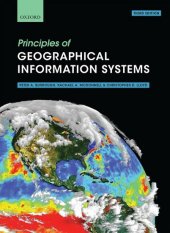 Neuerscheinungen 2015Stand: 2020-02-01 |
Schnellsuche
ISBN/Stichwort/Autor
|
Herderstra▀e 10
10625 Berlin
Tel.: 030 315 714 16
Fax 030 315 714 14
info@buchspektrum.de |

Peter A. Burrough, Christopher D. Lloyd, Rachael A. McDonnell
(Beteiligte)
Principles of Geographical Information Systems
3rd ed. 2015. 352 p. w. figs. 26,5 cm
Verlag/Jahr: OXFORD UNIVERSITY PRESS 2015
ISBN: 0-19-874284-3 (0198742843)
Neue ISBN: 978-0-19-874284-5 (9780198742845)
Preis und Lieferzeit: Bitte klicken
Principles of Geographical Information Systems provides a thorough, broad-ranging account of the theory and practice of GIS. It explains why spatial data and the information systems based on them are so important in the modern world for solving a range of practical problems.
Geographical data are used in so many aspects of our lives today, ranging from disaster relief operations through to finding directions on our mobile phones. We can all be data collectors, adding locational information as we capture digitally our day-to-day experiences. Geographical Information Systems (GIS) are the software tools that facilitate this, turning the raw data into useful information that can help us understand our worlds better.Principles of Geographical Information Systems presents a thorough overview of the subject, exploring both the theoretical basis of GIS, and their use in practice. It explains how data on the world are converted into digital form and the analytical capabilities used to bring understanding to a range of areas of interest and issues.
Spatial data are usually based on two, dichotomous paradigms: exactly defined entities in space, such as land parcels and urban structures, or the continuous variation of single attributes, such as temperature or rainfall. The adoption of one or the other influences how the geographical data are structured in the GIS and the types of analysis possible. A further area of focus in the book concerns the problems of data quality and how statistical errors in spatial data can affect the results of
spatial modelling based on the two paradigms of space. Fuzzy logic and continuous classification methods are presented as methods for linking the two spatial paradigms. The book concludes with an overview of current developments and trends in providing spatial data to an ever-expanding global
community of users.
Online Resource Centre
The Online Resource Centre to accompany Principles of Geographical Information Systems features:
For students:
˙ Datasets with instructions of how to repeat analyses presented in the book using widely-used software
For registered adopters of the book:
˙ Figures from the book, available for download
Review from previous edition [This second edition] builds upon the previous work in providing a very welcome basic, concise and more up to date introduction to the principles underlying GISs ... a osund and readable introduction to a complex subject. International Research in Geographical and Environmental Education, v. 9 no. 3, 2000


